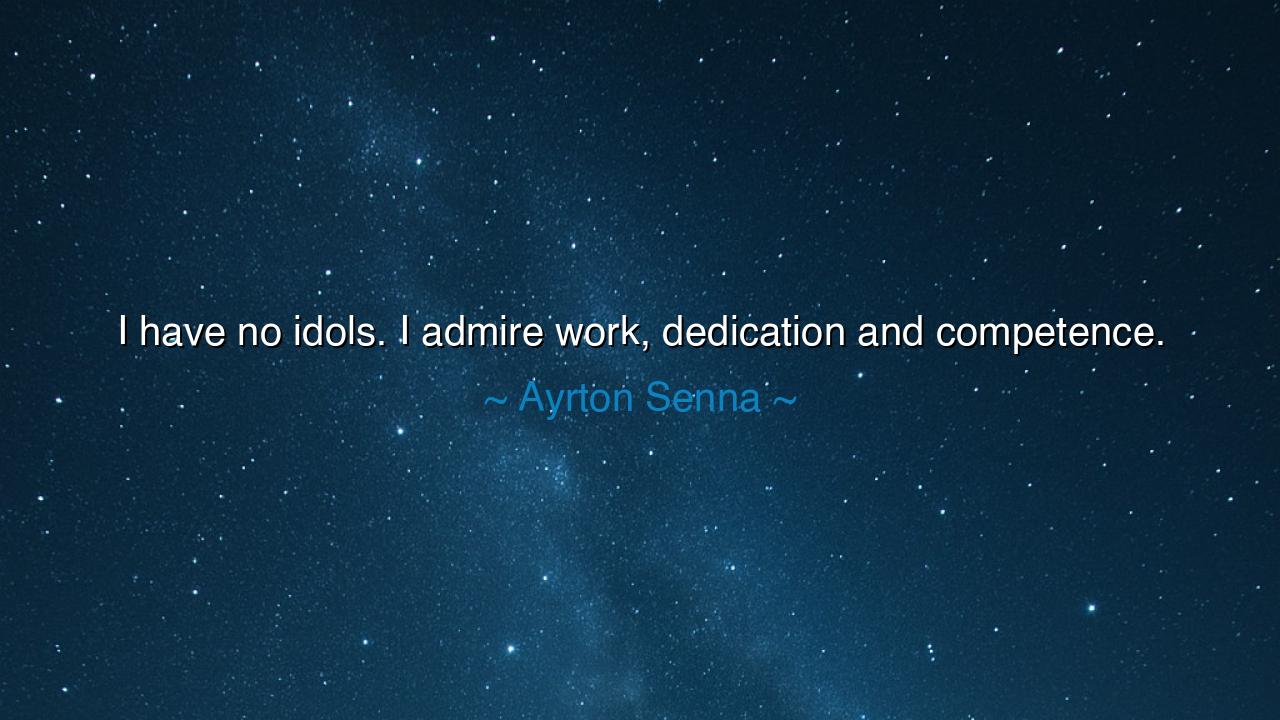
I have no idols. I admire work, dedication and competence.






The words of Ayrton Senna, spoken with the fire of a warrior and the clarity of a sage, proclaim: “I have no idols. I admire work, dedication and competence.” In this utterance lies the rejection of false gods, the hollow worship of men made of clay, and the embracing of what is eternal—the virtues that no decay can touch. For idols crumble, but work, dedication, and competence endure beyond the grave, leaving their mark upon history like carvings upon stone.
In declaring no idols, Senna speaks as the ancients once did, who warned against bowing to mere images, to shadows mistaken for light. He reminds us that greatness does not dwell in the adoration of names, but in the ceaseless labor of hands, the unyielding resolve of the spirit, and the mastery of craft. This is the path of the true hero: not to seek worship, but to cultivate strength until even the heavens take notice.
The triad he invokes—work, dedication, and competence—is itself a sacred teaching. Work is the sweat that shapes raw potential into form. Dedication is the flame that refuses to falter, burning through trial and doubt. Competence is the fruit of both, the mastery that makes effort divine. Together, they forge a life of meaning, a legacy that outlives flesh and fame. This is the eternal law of excellence, known to all who strive with pure heart.
Senna’s voice, though born in the arena of speed and danger, speaks to all who walk the earth. For he teaches that the measure of a person is not in whom they praise, but in what they embody. The one who exalts idols is a follower; the one who exalts virtue becomes a leader, a guide, a torch in the dark. His creed is not bound to the track, but to every field where human hands and human hearts pursue greatness.
Let the future remember: idols may inspire for a moment, but they vanish like smoke in the wind. Only the eternal virtues of work, dedication, and competence can build empires, heal nations, and carve immortality into the annals of time. These are the true gods that dwell not in statues or shrines, but in the soul of every man and woman who dares to strive with all their strength.






DALuu Duc Anh
Senna’s perspective on idolization is refreshing. He encourages us to value qualities like dedication and competence instead of blindly following others. However, I wonder if this dismisses the importance of role models altogether. Are role models really harmful if they inspire us to grow and work harder? It seems like a subtle balance—admiring qualities in others versus building our own identity and path based on their achievements.
NQTran Nghiem Quan
This quote makes me reflect on the modern obsession with celebrities and idolization. Senna’s view of admiring work and competence rather than individuals seems like a healthier approach. But I also wonder—can admiration be more than just about competence? Can we find inspiration in someone’s character or resilience, even if they’re not perfect? Is there room for admiration in a more holistic sense?
HDHuy Do
I appreciate Senna’s focus on work, dedication, and competence, especially since these qualities are often more sustainable than the idea of idolizing someone. But I wonder—can we ever truly avoid having idols? Are there people whose qualities or achievements inspire us to improve ourselves? Or is admiration something that can only be grounded in tangible traits like hard work, rather than the mystique of a figure?
KHbui thi kim hoa
Senna’s quote is powerful in its emphasis on the value of hard work over idolizing others. It challenges the notion of hero worship, which is often based on superficial qualities rather than substance. But does this mean that admiration for someone is always misplaced? Can’t we look up to someone’s achievements without losing sight of our own path? I think it’s a fine line between admiration and obsession.